

Megaupload: A Lot Less Guilty Than You Think. The recent Department of Justice decision to indict Megaupload for copyright infringement and related offenses raises some very thorny questions from a criminal law perspective.
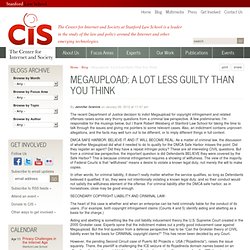
A few preliminaries: I’m responsible for the musings below, but I thank Robert Weisberg of Stanford Law School for taking the time to talk through the issues and giving me pointers to some relevant cases. Also, an indictment contains unproven allegations, and the facts may well turn out to be different, or to imply different things in full context. DMCA SAFE HARBOR: BELIEVE IT AND IT WILL BECOME REAL: As a matter of criminal law, the discussion of whether Megaupload did what it needed to do to qualify for the DMCA Safe Harbor misses the point. Did they register an agent? Did they have a repeat infringer policy? In other words, for criminal liability, it doesn’t really matter whether the service qualifies, so long as Defendants believed it qualified. Rojadirecta’s lawyers at Durie Tangri have challenged the U.S. MegaUpload Users Plan to Sue the FBI over Lost Files. In most reports following the MegaUpload shutdown, the site is exclusively portrayed as a piracy haven.
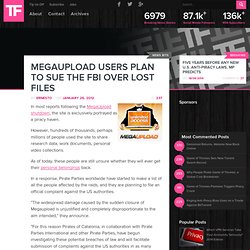
However, hundreds of thousands, perhaps millions of people used the site to share research data, work documents, personal video collections. As of today, these people are still unsure whether they will ever get their personal belongings back. Pirate Parties Organizing Lawsuit Against FBI Over Megaupload Takedown. The Megaupload troubles make for interesting discussion because there is much to be said on both sides.
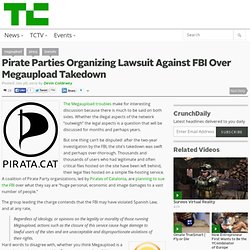
Whether the illegal aspects of the network “outweigh” the legal aspects is a question that will be discussed for months and perhaps years. But one thing can’t be disputed: after the two-year investigation by the FBI, the site’s takedown was swift and perhaps over-thorough. Thousands and thousands of users who had legitimate and often critical files hosted on the site have been left behind, their legal files hosted on a simple file-hosting service.
MegaUpload Alternatives See Surge in Traffic After Shutdown. After losing access to their favorite file-hosting service last week, millions of former MegaUpload users have fled to the many alternatives available.

Filefactory, Depositfiles and many of the other top cyberlockers have seen an unprecedented surge in traffic in recent days, showing that people haven't stopped sharing even though the authorities have closed one of the main players in the business. With a self-proclaimed 50 million users a day, MegaUpload was one of the largest file-hosting sites on the Internet. Last week the feds shut down the popular site accusing its founder and six others of money-laundering and several copyright related crimes. The site’s former users, meanwhile, are left without their files and forced to find a new place to share. The big question is, where do these millions of people go now?
Filesonic Kills File-Sharing Service After MegaUpload Arrests. Filesonic, one of the Internet's leading cyberlocker services, has taken some drastic measures following the Megaupload shutdown and arrests last week.
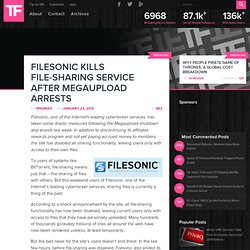
In addition to discontinuing its affiliates rewards program and not yet paying accrued money to members, the site has disabled all sharing functionality, leaving users only with access to their own files. Cyberlocker Ecosystem Shocked As Big Players Take Drastic Action. In the wake of last week's Megaupload shutdown, some of the biggest names in the market are taking drastic action.

During the last 48 hours many sites have completely withdrawn their systems for paying uploaders when their files are shared with others, but one of the most dramatic moves came first from Filesonic and today Fileserve. Both services now forbid people from downloading any files they didn't upload themselves. While the shutdown last week of Megaupload and the arrest of its founder and management team was certainly dramatic, a situation of perhaps even greater gravity is beginning to emerge. Over the past 48 to 72 hours, the operators of many prominent cyberlocker services have been taking unprecedented actions that can not simply be explained away by mere coincidence. R.I.P. FileSonic & Uploaded.to. Anti-Piracy Warnings Have No Effect on iTunes Sales.
To back up their demands for tougher anti-piracy laws, the music industry often promotes statistics that show how drastically sales improve when they have their way.

MegaUpload Takedown Proves SOPA and PIPA Are Unnecessary. It has been a huge week when it comes to protecting intellectual property and defending the freedom of the Internet.
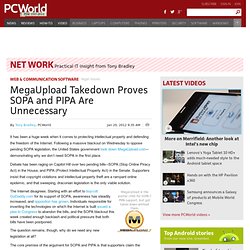
Following a massive blackout on Wednesday to oppose pending SOPA legislation, the United States government took down MegaUpload.com--demonstrating why we don’t need SOPA in the first place. Debate has been raging on Capitol Hill over two pending bills--SOPA (Stop Online Piracy Act) in the House, and PIPA (Protect Intellectual Property Act) in the Senate. Supporters insist that copyright violations and intellectual property theft are a rampant online epidemic, and that sweeping, draconian legislation is the only viable solution. The Internet disagrees. Starting with an effort to boycott GoDaddy.com for its support of SOPA, awareness has steadily increased, and opposition has grown. The question remains, though, why do we need any new legislation at all? The DOJ case against MegaUpload relies on ProIP legislation passed in 2008. Megaupload shut down by feds, seven charged, four arrested.